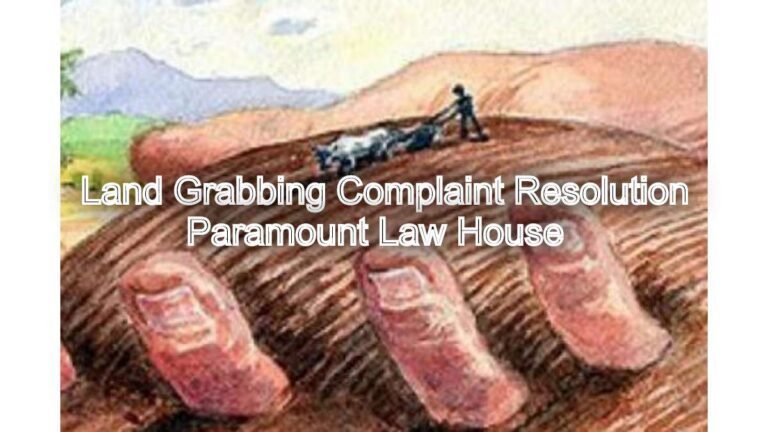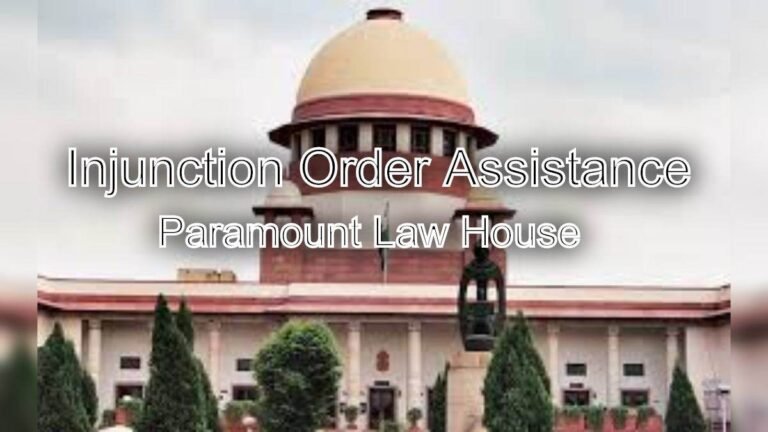Stay Order Assistance: Protect Your Property Interests
Stay Order Assistance – Property disputes create stress and uncertainty. Many people fear losing possession or facing unlawful interference. In such situations,…
Stay Order Assistance – Property disputes create stress and uncertainty. Many people fear losing possession or facing unlawful interference. In such situations, a stay order becomes a powerful legal safeguard. It helps protect ownership, possession, and rights. At Paramount Law House: Property Lawyers 24×7, we guide clients through stay order proceedings. We ensure their property interests remain secure.
Stay Order Assistance: Protect Your Property Interests: Paramount Law House
Understanding Stay Orders
A stay order is a directive issued by a court. It temporarily halts an action or maintains the status quo. Courts issue such orders to prevent injustice until the matter is finally decided. Property matters often involve urgent relief. A stay order ensures no third party disturbs possession. It also prevents unlawful construction or transfer.
Legal Foundation of Stay Orders
Stay orders derive from the principles of equity. Courts use them to maintain fairness and justice. Under civil procedure law, interim injunctions and stay orders play an essential role. They stop the misuse of power and unlawful interference. In property disputes, a stay order safeguards legal rights until the court hears the case fully.
Types of Stay Orders
Different kinds of stay orders exist. Each one serves a specific purpose:
- Stay on eviction: Protects tenants or occupants from unlawful eviction.
- Stay on transfer: Prevents sale or transfer of disputed property.
- Stay on construction: Stops illegal building activities on land.
- Stay on execution of decree: Delays enforcement until higher courts review.
Each type aims to protect possession, ownership, or contractual rights.
When to Seek a Stay Order
People usually seek stay orders in urgent cases. For example, when property faces unlawful occupation, immediate relief becomes vital. Similarly, if one party attempts to sell disputed land, a stay order prevents irreversible harm. Courts grant such relief to protect property until a full hearing. Timely legal advice ensures effective protection.
Filing Process for Stay Orders
The process begins with filing a suit or petition. A written application requests the court for interim relief. Lawyers must present facts, evidence, and legal grounds. The court considers urgency, balance of convenience, and irreparable harm. If convinced, the judge grants a stay order. Later, both parties get a chance to present arguments.
Importance of Drafting
Drafting a strong application is crucial. Lawyers must show the seriousness of the threat. They also highlight potential loss if the order is denied. Legal drafting must contain clear grounds, supporting documents, and case law. Proper drafting increases the chances of success.
Role of Property Lawyers
Property lawyers play a vital role in stay order cases. They analyze the dispute, identify risks, and prepare the right legal remedy. They represent clients in court and counter the other party’s arguments. Lawyers ensure compliance with procedural rules. They also handle follow-up hearings and long-term litigation strategy. At Paramount Law House, we provide end-to-end support in stay order assistance.
Balance of Convenience
Courts grant stay orders after weighing the balance of convenience. This means the court considers which party would suffer greater harm. If not granting relief causes irreparable damage to property, the court favors granting a stay. Legal arguments must strongly emphasize this balance.
Evidence in Stay Order Cases
Courts rely heavily on evidence. Title deeds, sale agreements, and possession records matter most. Photographs, property tax receipts, and government records also strengthen the case. Documentary evidence adds credibility. Lawyers present these documents carefully to support interim relief.
Duration of Stay Orders
Stay orders are temporary in nature. They last until the court decides otherwise. Sometimes courts extend them after review. In other cases, they last until the final judgment. However, misuse of stay orders attracts strict judicial scrutiny. Courts aim to prevent unnecessary delays.
Risks and Misuse
Though stay orders protect rights, misuse remains a problem. Some parties seek them only to delay justice. Courts view such actions unfavorably. If a party suppresses facts or provides false information, the stay may be vacated. In some cases, courts impose penalties. Therefore, honest representation becomes essential.
Appeal and Revision
If a lower court denies a stay, parties may appeal. Higher courts have the power to modify or grant relief. Revision petitions also serve as remedies. However, the success depends on legal merit. Lawyers must present strong grounds for appeal.
Stay Orders in Real Estate Disputes
Real estate transactions often trigger litigation. Stay orders prevent developers from altering property during disputes. Buyers seek them to stop unlawful transfers. Builders also use them to protect ongoing projects. Such orders maintain fairness while disputes undergo trial.
Family Property Disputes
Family property disputes are common in India. Stay orders help prevent partition, sale, or misuse of ancestral property. They protect shares of rightful heirs. Courts ensure fairness while deciding complex family matters. Legal aid plays a significant role in such sensitive cases.
Commercial Property and Tenancy
Stay orders also apply to commercial property. Landlords or tenants seek them in eviction disputes. Businesses rely on them to avoid disruption. A stay order ensures operations continue until resolution. This relief becomes vital for safeguarding investments.
Criminal Angle in Property Matters
Sometimes property disputes involve criminal complaints. Illegal possession, encroachment, and trespass lead to both civil and criminal cases. Stay orders protect lawful possession while courts examine the criminal side. This dual approach ensures justice.
Why Timely Action Matters
Delay reduces the chances of success. Courts prefer parties who approach them quickly. Immediate filing strengthens the claim of urgency. Waiting too long may harm credibility. Therefore, timely legal assistance remains essential.
Long-Term Strategy
Stay orders are temporary. Hence, parties must prepare for final trial. Evidence, witnesses, and legal strategy matter in the long run. Winning interim relief should not delay preparation for the full case. A long-term vision protects property interests permanently.
Frequently Asked Questions
A stay order is a temporary directive from the court. It halts actions like eviction, transfer, or construction on disputed property. It preserves the current status until the case is decided. This prevents unfair loss or irreversible harm.
You should apply immediately when there is a threat to your property. For example, if someone attempts illegal possession or tries to sell disputed land. Courts favor applicants who act promptly. Delay can reduce the chances of relief.
Essential documents include property title deeds, sale agreements, tax receipts, and possession proof. Supporting evidence like photographs and government records also strengthen the case. Strong documentary proof increases the chances of success in court.
Stay orders are temporary. They usually last until the next hearing or until the final judgment. Courts may extend them if required. However, they can also be vacated if misused or obtained through false information.
Property lawyers understand legal procedures and drafting requirements. They present facts, evidence, and legal arguments effectively. Lawyers also ensure compliance with court directions. Professional representation increases the chances of securing and maintaining a stay order.
Conclusion
A stay order serves as a shield in property disputes. It preserves ownership and prevents unlawful interference. Courts grant it when urgency and fairness demand protection. Yet, its effectiveness depends on proper legal drafting, evidence, and strategy. At Paramount Law House: Property Lawyers 24×7, we help clients secure their property rights. With timely action, clear evidence, and strong representation, property owners can safeguard their interests. Ultimately, a stay order is not just a legal remedy. It is a lifeline that ensures property justice remains intact.
Read More
- Succession Planning Made Simple: Legal Assistance Available
- Transfer of Property to Legal Heir after Death: Expert Advice
- Rent Recovery Services: Swift and Effective Solutions
- Property Purchase Agreement Legal Services: Expert Assistance
- Property Document Verification: Ensure Accuracy and Legitimacy
- Supreme Court of India (Official Website)






